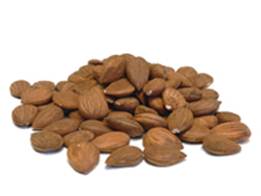Apricot kernels are edible nut-like objects found within the stone of fresh apricots. There are different types of apricot kernels—those with the skin on contain high levels of cyanide that can be released into the body when eaten. Those with the skin off also contain cyanide, but at lower levels.

Raw apricot kernels – with skin on
Some raw apricot kernels are promoted as an alternative therapy for cancer treatment. Howevver the Cancer Council of Australia has cautioned consumers about using apricot kernels as an alternative therapy.
There have been reports of poisoning incidents in Australia, New Zealand, Canada, United Kingdom and Europe from eating raw apricot kernels.
In 2011 a consumer in Queensland was hospitalised after consuming raw apricot kernels with high levels of hydrocyanic acid. At the time, FSANZ warned consumers not to consume raw apricot kernels.
Consumer advice
Based on new information, FSANZ has revised its earlier advice and now advises that it is unsafe for adults to eat more than three raw apricot kernels (with skin on) per day. Children should not eat any.
Consuming processed foods derived from apricot kernels (e.g. amaretti biscuits, almond finger biscuits, apricot jams, and apricot nectar) doesn’t pose a risk because processing or cooking these foods reduces cyanide to safe levels.
Apricot kernel proposal
FSANZ is working on a proposal to consider how best to manage the risk of hydrocyanic acid in raw apricot kernels.
A call for submissions report is expected to be released in early 2014.





